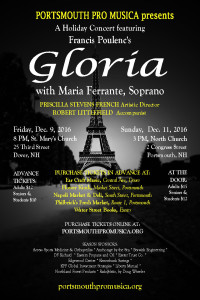Latest PPM News, Slider Image
Program Notes – Christmas 2016

Not sure what you’ll hear at PPM’s Christmas Concert? Here is an in depth look at a few of the songs we will be performing. Tickets available HERE. Buy now for a discount!
Ralph Vaughan Williams began serious study of the English folk song in the early 1900s – a time when it was becoming extinct due to oral tradition being replaced with printed music. Vaughan Williams traveled into the English countryside collecting, transcribing and ultimately preserving many tunes, several of which were incorporated into the English Hymnal where he served as editor in 1906 (for example, For All the Saints). The foundation of “Fantasia on Christmas Carols” is four traditional English carols plus fragments of other tunes heard in the accompaniment (The First Nowell, The Truth Sent From Above, Come All Ye Worthy Gentlemen, On Christmas Night). This beautiful improvisatory composition, a favorite of choirs, was written for baritone solo, mixed chorus and orchestra for the Three Choirs Festival at Hereford in 1912.
In 1959 while still living in Paris, Francis Poulenc received a commission from the Serge Koussevitsky Foundation to compose a symphonic work in memory of long-time Boston Symphony Orchestra conductor Serge Koussevitsky and his wife Nathalie. However, Poulenc preferred a work which would express his Catholic faith. The composer’s friend and partner Pierre Bernac sent him the Latin mass text and translation. The result is a brilliant setting of the “Gloria” scored for soprano solo, chorus and orchestra which Poulenc dubbed a “choral symphony.” The work was fully orchestrated in 1960 and had its world premiere on 20 January 1961 by the BSO, Chorus Pro Musica and Adele Addison under the direction of BSO conductor Charles Munch.
Of the six parts of the mass movement #s 1, 2, 4, 6 are jubilant and in a fast tempo – while #s 3 and 5 are more pious and introverted in a slower tempo. Poulenc’s gift for short melodic fragments is apparent in the more playful movements, and the vocal writing feels intuitive. Interspersed with these sounds are several jarring passages of dissonance. In other spots the singers are required to shift to new tonalities and even jazzy 7th chords. The composer’s style is eclectic and a true feast for the ears! The writing for soprano solo, difficult at best (#s 3, 5, 6), demands a high tessitura (register) above the treble staff often at a pianissimo dynamic level. The signature majestic chords which open the “Gloria” return in the final movement. The soprano solo leads us to a prayerful conclusion sung over lush harmonies reminiscent of French composer Maurice Ravel.
Francis Poulenc was part of a group of rebellious French composers in the 1920s called “Les Six” led by Erik Satie whose style was generally brash and jovial and deliberately broke with tradition. To be sure, there is the element of surprise in this exuberant and masterful setting of the “Gloria!” Other well-known sacred works include the Mass in g minor, Four Penitential Motets and Stabat Mater.
Our closing piece “Christmastide” (Jessye’s Carol) was composed c. 1984 by British composer Donald Fraser. Donald Fraser studied composing and conducting at London’s Royal College of Music and subsequently worked in film/TV. He left London and moved near West Sussex in the 1980s where he purchased The Studio, home to Edward Elgar who composed his last major work there, his cello concerto. One of Fraser’s works during this time included the composing and recording of “A Christmas Symphony” (including “This Christmastide” also known as “Jessye’s Carol”) with soprano Jessye Norman, the American Boychoir and New York Choral Society. In 1996 Fraser became conductor of Illinois Chamber Symphony Orchestra and in 2010 director of music at Christ United Methodist Church in Rockford, ILL where he continues to work as a composer and conductor. – PSF
Now that you’ve read all that amazing history behind our concert pieces, you must be ready to buy your tickets! Here’s the link again so you don’t have to scroll up. Tickets are here! Discounts in now, more at the door.

The Friday evening concert was exceptional in that it bridged traditional the Christmas fare of Ralph Vaughan Williams’ “Fantasia” with the ambitious “Gloria” by Francis Poulenc. The latter work is not quite the typical Poulenc for those looking for his signature harmonics. The making of the piece, as always, is a choir of blended voices that combine with exquisite precision in articulation and notes. The guest soprano moved the evening’s program to an ethereal level, sweeping the audience away. It is just the most polished and ambitious of PPM’s work to date. Thank you all for the event that kicks off the holiday season for us with such beauty.